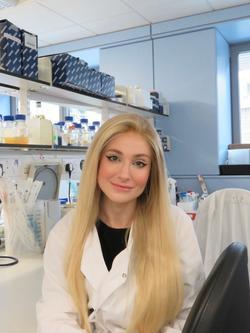Meet Early Career Microbiologist of the Year poster finalist: Emily Addington

What are your current research interests?
My current project is focused on the genotoxin colibactin, which is produced by bacterial strains which carry the pks island, predominately E. coli. I am curious about the regulation of this genotoxin, the variation in its production across strains, and how supplementation with amino acids may influence levels of colibactin transcription. It’s a fascinating project because I find myself looking at very direct molecular aspects, but also being very interested in the larger downstream picture of what colibactin does, which is damage DNA and lead to carcinogenesis. The project is wonderfully diverse, allowing me to work on many things simultaneously.
How would you explain your research to a GCSE student?
I am researching a bacterial toxin called colibactin which can damage DNA and cause cancer. The bacteria that produce this toxin carry a large segment of DNA needed to make colibactin, called the pks island. We know that many bacteria, mostly E. coli, found in our guts (even healthy guts), have the pks island and the potential to produce colibactin. We also know that certain conditions, such as diet, can cause bacteria to produce more or less colibactin. We are interested in an amino acid which appears to lower the production of colibactin, in the hopes that by inhibiting colibactin being made, it can prevent the cancers associated with this genotoxin.
How has getting involved with Microbiology Society activities benefited your professional development?
I first joined the Microbiology Society way back in 2014 when I was a summer student and have been a member through every step of my career. I presented my first poster ever at a Microbiology Society Annual Conference, which was also my first ever academic conference. I secured my first-ever independent grant from the Microbiology Society, an outreach grant, which allowed me to run my own research project for the first time. I have also met most of the microbiologists I know through the Microbiology Society, at conferences and events, and made connections that I hope will last me my career. In short, the Microbiology Society has been invaluable in my professional development, from summer student to postdoctoral researcher.
What does being a part of the Microbiology Society community mean to you?
Being part of the Microbiology Society community means collaboration with incredible microbiologists here in the UK and internationally, networking opportunities, opportunities to hear and learn about incredible science, and opportunities for funding and participation in microbiological initiatives. Being a member is being part of a much larger, diverse collective of microbiologists at all career stages, who are passionate about sharing their science and tackling global microbiological issues.
What do you love most about your job?
I love that my job is always challenging and always different, requiring a lot of problem-solving and the ability to be creative with my science. It’s a job which gives you a lot of autonomy and encourages you to constantly grow in skill, competence, and independence. Science doesn’t get stagnant, there’s always something new to chase down and explore and it means I get up every day eager to get into the lab and work on the things that interest me. I also get to work with wonderful, passionate, and incredibly intelligent people who are all so driven about their science, and it makes for a great environment.